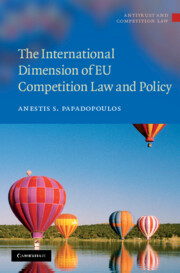Book contents
- Frontmatter
- Contents
- List of Tables
- Acknowledgements
- Abbreviations
- Table of Cases
- Table of Legislation
- Table of Treaties and Agreements
- 1 Introduction, Structure of the Book and Method
- 2 The National and International Dimensions of Competition Law and Policy
- 3 Bilateral Enforcement Cooperation Agreements
- 4 Bilateral Trade Agreements which Include Competition Provisions
- 5 Plurilateral Regional Agreements which Include Competition Provisions
- 6 The Role of Competition Law and Policy of the EU in Multilateral Negotiations on Competition
- 7 Conclusions: Main Findings of the Study
- Appendix 1 Economic Theories Applied to Competition Law
- Appendix 2 General Information about Plurilateral Regional Agreements
- Bibliography
- Index
5 - Plurilateral Regional Agreements which Include Competition Provisions
Published online by Cambridge University Press: 10 November 2010
- Frontmatter
- Contents
- List of Tables
- Acknowledgements
- Abbreviations
- Table of Cases
- Table of Legislation
- Table of Treaties and Agreements
- 1 Introduction, Structure of the Book and Method
- 2 The National and International Dimensions of Competition Law and Policy
- 3 Bilateral Enforcement Cooperation Agreements
- 4 Bilateral Trade Agreements which Include Competition Provisions
- 5 Plurilateral Regional Agreements which Include Competition Provisions
- 6 The Role of Competition Law and Policy of the EU in Multilateral Negotiations on Competition
- 7 Conclusions: Main Findings of the Study
- Appendix 1 Economic Theories Applied to Competition Law
- Appendix 2 General Information about Plurilateral Regional Agreements
- Bibliography
- Index
Summary
History of plurilateral regional agreements, reasons that led to their adoption and the role of competition law and policy
Historical development of plurilateral regional agreements
Europe
While there can be discerned an overarching tendency in the last twenty years for states to become involved in plurilateral regional trade agreements, the origins of the creation of such agreements in various parts of the world date back to earlier centuries. For instance, in Europe, the continent where regionalism has developed further than anywhere else in the world, the ideas about unification of European countries originated in medieval times. As seen in the previous chapter, a number of bilateral trade agreements were concluded between these countries in the nineteenth century, and the Prussian Zollverein established in 1834 was considered the first plurilateral regional agreement in the world. These agreements lost favour in the first half of the twentieth century, as nationalistic policies dominated the region and led to two destructive World Wars. Nevertheless, following the Second World War, a wide network of agreements was created in Europe, including the European Economic Community (which later became the European Union and which has been to date the most comprehensive and successful such initiative in history), as well as the European Free Trade Association (EFTA) and the European Economic Area.
Latin America
This tendency towards the creation of plurilateral regional agreements also appeared as early as the eighteenth and nineteenth centuries in certain other parts of the world, such as South America and Africa.
- Type
- Chapter
- Information
- The International Dimension of EU Competition Law and Policy , pp. 145 - 204Publisher: Cambridge University PressPrint publication year: 2010



